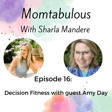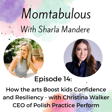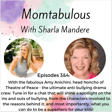Become a Creator today!Start creating today - Share your story with the world!
Start for free
00:00:00
00:00:01

All about Bullying - Save the Drama for your Mama Pt 2
Amy Anichini and I continue our conversation about bullying. What do you do if you find out your kid IS exhibiting bullying behaviors? And how your tween/teen can get involved with Theatre of Peace - Anti-Bullying Theatre Troupe from anywhere in the world, help other kids and be a positive light for a child who is struggling. (pt. 2 of 2)
Resources discussed in this episode can be found at:
https://www.actlikeyoumatter.org/
T.O.P. Talks - How to Find Your Trusted Adults:
https://youtu.be/M_jc4sHNtwc?si=JJ7FFifP--hVjpvJ
Bullying resilience Coaching for Kids, Teens, & Families with Amy
https://www.actlikeyoumatter.org/bullying-resilience-coaching/
Become part of T.O.P.!
Recommended
Transcript
Encouraging Open Communication with Kids
00:00:15
Speaker
Okay, welcome back. I'm back with Amy Anikini for episode two. We're going to pick up where we left off. So how can
00:00:24
Speaker
we get our kids to talk with us about the big stuff. Like, is there some kind of groundwork we need to lay? Is there anything? Like, I know with my oldest, with both my kids, I remember from the time they were toddlers, like the time they could talk, I'd be like, there are no secrets from mommy. There are no secrets. And then my mom would be like visiting in town and she'd be babysitting them or whatever, and I'd come home. And my oldest was like, you know, four, would be like,
00:00:52
Speaker
Grammy gave us candy and told us not to tell you. My mom would be like, wait, that was our secret. And she would go, there are no secrets from mommy. And I was like, that's right. My mom would get so mad.
Building Trust Through Everyday Conversations
00:01:07
Speaker
when they were four, but now at 14, you know, it's like, Girl, talk to me. No, I've got it. I'm going to talk to a friend. Right. So it's good that they have friends to talk to you. But how do you get your kids to talk with you about the big stuff? Right beyond preschool. Yes, exactly. And I love this term big stuff, too. And I'm gonna, you know, sort of echo that back to you in my sort of overall answer.
00:01:29
Speaker
I would suggest that if you want your child to come to you with the big stuff, you need to be present, ready to listen and attentive when they come to you with the small stuff. Because the small stuff is not small to them, right? So I have a, I'm going to give you an example of a friend of mine, a dear friend of mine who is also the mom of two girls, same age as my girls. She used to complain to me when her girls were, you know,
00:01:57
Speaker
Older elementary and even into middle school that one of her daughters Would always want to give her the blow-by-blow about whatever TV show she was watching and my friend was like, oh my god Why does she want to talk to me about television? That stuff's not real Isn't it? Yeah, right. Well, maybe
Importance of Listening and Timing in Communication
00:02:16
Speaker
Maybe, and my friend and I, we talked about this too, so it's not like I was just judging her behind her back or something. Maybe there was something that her daughter, maybe there's something that our kids see in a show that they're watching or a book that they read or a movie that they saw that echoes or something that's happening in their life or that's familiar to them.
00:02:40
Speaker
And it's a segue into maybe testing the waters about something bigger that they might want to talk to us about. And if we can be present for those smaller things, that lays the groundwork for them to trust us and know that we are going to listen. Because if we're listening to that little stuff,
00:03:04
Speaker
Of course we're going to listen to the big stuff, you know? I read a book for any parent of a daughter, I would recommend this, Queen Bees and Wannabes by the amazing Rosalind Wiseman. And I read this as my older daughter was sort of nearing the end of elementary school and heading into middle school. And Queen Bees and Wannabes, in case I misspoke the title,
00:03:28
Speaker
There's one line in that book that resonated with me, and I have never forgotten it, and it is this. If your teenage daughter comes to you and says she needs to talk to you, drop everything and talk to them.
00:03:43
Speaker
Um, now they're the reality of life, right? You know, I'm getting ready to get on a podcast recording. Um, but I'll circle back around with you. How's 5pm for you? You know, let's circle back around with each other. I want to hear this. I've just got a meeting right now getting on a call or whatever, but, um, and, you know, and it goes for whether we have, you know,
00:04:02
Speaker
a daughter or a son or a child of any gender or no gender. Being there, being ready, being prepared to listen, and being that sort of safe space for them, I think that lays the groundwork. And we're all busy, right? Many of us are two job families and everybody's busy and hyper-scheduled, but you can always find time. And you can even schedule
00:04:32
Speaker
time with each other, like I said. Just normalize talking, having those, you know, tough conversations. No, I love that. I love
00:04:39
Speaker
You have to be there for the small stuff to be there for the big stuff and show them that, that trust that you have to build that foundation. I'm going to listen, even if what I think you're telling me about is boring. I'm here. I'm listening. I've heard it 17,000 times already. I watched the TikTok video. I'm always like, you showed me that one. Yeah. You showed it to me. I'll watch it again, but you showed it to me. And I agree. And it does get frustrating, but you know,
00:05:09
Speaker
It's our job as parents, right, to figure out why did our child want to tell us this? There's got to be something else, right? I mean, and sometimes it's just, I just want to connect with
Addressing Bullying: Approach and Family Influence
00:05:20
Speaker
you, mom. I just want to like be where you are. I want to have a conversation and it might just be about something silly, but I just, I just kind of need you right now and I just want to be, you know, with you, you know, so it's our job to kind of figure out, you know, what are they trying to tell us and read between the lines and
00:05:36
Speaker
those kind of things. Maybe there's something about this TikTok video that was inspiring. Maybe she wants to be that kind of dancer. Maybe she wants to write that kind of music. Yeah. I don't know, you know, but we're never going to know. It's cute and funny. Yeah. Yeah. Exactly. Maybe it's just, you know, I just want to show you something that just made me laugh, you know? I love it. There's so much we can talk about. I feel like we could do three episodes. I want to keep these short. So one more question for you.
00:06:06
Speaker
What do you do if you find out that your child is the like perpetrator of the bullying? If they are the one that is bullying others. Right. And again,
00:06:19
Speaker
Not an easy answer. But I will say I would love to steer people back to all of the things that you and I were discussing when we were talking about what if you get a suspicion that your child is the target of bullying behavior because there's a lot that's really similar. And first and foremost, it's talk to them.
00:06:36
Speaker
level-headed, calm, level-headed, in at the right time, not at a time of heightened escalation, not under the situation of, um, hey, I really need to talk to you about something, you know, not that kind of thing. It's just, we're having dinner together. It's just the two of us. Or, you know, we're having a snack or we're just casually talking about your day. Or my favorite, you're driving them somewhere.
00:06:59
Speaker
because they can't get away, you know, approaching it. And as you would approach it with your student who you suspect might be at the target of bullying behavior, start with what you've observed. You know, I've noticed, you know, that you're coming, you seem to have more money.
00:07:17
Speaker
you know then then you had before may i ask you about that you know you have a job that i don't know about is someone giving you money because sometimes you know their their student might be taking someone else's you know money or they come home with a jacket that you don't recognize.
00:07:34
Speaker
or the phone that isn't theirs or that kind of thing. Those are great times to say, oh, that's really interesting. You know, I don't recognize that as your phone. You know, it's just, you know, that calm sort of level-headed, I've noticed this. Can you tell me, you know, can you tell me about that? Being curious, being curious. And I always like to say be a detective because when you ask these questions,
00:07:57
Speaker
You know, we don't really know, you know, I might suspect my child is the target of bullying. I might wonder if my child is the student who's the perpetrator of a bullying behavior. But at the end of the day, we really don't know. I mean, these behaviors could really be anything. It could be
00:08:13
Speaker
a learning disability surfacing. It could be that they're realizing that they're neurodiverse, you know, maybe they have ADHD, you know, or maybe it's the onset of anxiety or the onset of an illness. So if we just ask these questions in a, I want to understand, you know, I want to know you, I want to know your life, I want to understand what's going on with you, you never know what you're going to uncover.
00:08:40
Speaker
Now, let's get back quickly to, you know, what if you think your child might be the perpetrator of bullying behavior. Again, for those who would love to do research online, that stopbullying.gov website has got some great ideas about some of those typical kind of warning signs like coming home with possessions that, you know, you don't recognize. And there are quite a few.
00:09:01
Speaker
I'll spare us the list, but that resource is out there if anybody wants to find that. And I do want to touch on again something that I said that more often than not, bullying is a learned behavior. And this next part is not going to be easy for anybody to hear. But if you think that your child might be being aggressive, you know, with other students, please take a look inside your own home and at your own relationships. Is somebody demonstrating that by being
00:09:30
Speaker
aggressive or shouting or attempting to control somebody else that you get what you want. Is that being demonstrated somewhere in your life? And if you take that hard look at those relationships and the people in your family and your close-knit group who your child has relationships with and you realize, no, absolutely not. It's not stemming from here. Then the detective work kind of continues. Where is it stemming from? And you can ask them casual
00:10:00
Speaker
questions like, you know, um, you know, Hey, what'd you do after school today? What'd you do on the way home from school? And no, any new friends in the friend group, you know, you can just kind of start that conversation to sort of sleuth out, you know, where this kind of thing, um, might be happening. And again, along the lines of learned behavior, someone might be treating them in this way, sibling and older siblings or cousin family, right? Like friends, cousins. Yeah.
00:10:29
Speaker
Yeah, so sometimes, and we actually noticed this with our own daughter, is that she was kind of learning that, oh, if you just shout and you try to have control over somebody else, you get what you want. It's learned. So someone might've mistreated your child and that might've led them to believe, oh, okay, well,
00:10:52
Speaker
If I don't want to be the one who's going to be picked on or targeted, I better be the strong one. I better be the one who's in control or has power over others. The silver lining about this whole learn behavior thing that I keep bringing up is that it's a behavior. These things are behaviors.
00:11:14
Speaker
They're not an identity. In our work, we try very hard to never use
00:11:23
Speaker
bully as a noun and similarly to never use victim as a noun. We like to say things like, you know, the student who was the target of bullying behavior or the student who was the perpetrator of bullying behavior or who behaved aggressively, you know, that kind of thing. So it's important, you know, when we label somebody, they start to think of themselves as, oh, that's me. That's my identity. That's how I fit in. That's who I am.
00:11:47
Speaker
But if instead we look at it as what it is, a behavior that was learned, more positive behaviors and more positive ways of communicating can also be learned.
Theater of Peace: Supporting Kids through Arts
00:11:57
Speaker
And sometimes we might need the help of a professional for that. But there also are so many resources, you know, out there.
00:12:04
Speaker
online. And one of those resources, I hope we have a, do we have a moment for me to mention one other thing related to this? Okay. One thing I wanted to add is that if anybody finds themselves in the middle of this, you know, where you suspect that your child is either the target of bullying behavior or is the
00:12:21
Speaker
perpetrator of such behavior if you find yourself stuck treading water you don't quite know what to do next this is what this is one of the things that i do um you know i i am a bullying resilience coach for kids and teens and and families and you know if someone visits our website again and i know we'll have a way to have links for people but act like you matter org
00:12:43
Speaker
great and you just click on bullying resilience coaching you can set up a complimentary session with me and we can talk about what's going on and we can see if we agree that i might be able to be a resource and you know kind of help you through these kind of things yeah also you have you know the theater of peace which is one of my favorite things
00:13:04
Speaker
Yes. Yes. And we should, we should, we should share for your listeners, we should share just a bit of the background. Why don't you? Well, you want to jump into that piece? Yeah, it was started in my living room, when my oldest who's now in high school was like six months old. And I had been working with a group of teenagers. And I was like,
00:13:26
Speaker
You know, we want to, we want to do this kind of a thing and, and are you in and they were like, yes, yes, yes. And so we sat, we named it and, and we started, you know, working with some schools and we did a lot of the like K to six. And then we went into the high schools and top, as we call it theater piece top, you know, really was born in. I ran that for a number of years in San Diego and your daughters, I found Jason Jordan through an audition.
00:13:54
Speaker
And it joined and Chase was like our youngest member. I remember being like, Oh, I've got all these high school kids. And she was, what was she fifth grade, sixth grade? She was 10, I think when she joined you. But you guys have wrote a book right about her experience being bullied. And, you know, and I remember telling you like, this is an elementary school assembly. And you were like, I don't think so. And now
00:14:19
Speaker
And now here we are. You know, we got to the point where, you know, you ended up transitioning theater piece. Yeah. That's my kids, you know, I had my second and my dad got sick and it just was too hard to, to, to do everything. I'm so glad that you took over. It was, it was so much the right fit and the right choice. And you've done amazing things with it. You know, your girls have kind of outgrown it. They're in college that you have, you're still doing it. And I think you found this passion with it and you're helping so many people.
00:14:49
Speaker
So if the kid wanted to get involved in theater of peace, what are the age ranges? How would they do it? Do they have to be local in San Diego? Or how do they do that? Great question. And first of all, let me just sort of add on to what you were saying. Thank you for trusting me to be the person to sort of carry the torch forward. And who knew in 2015, when you passed the torch to me, that we would be here?
00:15:13
Speaker
in 2024. So just wonderful. So yes. All right. So let's get back to the question in hand. So we are always seeking new students to join Theater of Peace. Our age range is 11 to 19. Not that tennis too young.
00:15:34
Speaker
But we do talk about a lot of aspects of growing up, and we find that if a student is 11, they're sort of ready for some of those topics that we're going to talk about. So ages 11 to 19, they do not have to be local. For the students who perform with us,
00:15:51
Speaker
you know, in person on campus at a San Diego County school, those students, you know, need to be local. But we have so many other things that we do besides that, that we need people for and they can be located anywhere. So first, let me steer people toward
00:16:09
Speaker
where they can find more information about how to get involved. So if you go to our website, and again, we'll have a link, actlikeumatter.org and click on a theater piece. There'll be a link that says join theater piece. It's got all the steps. It's easy. They just submit a video. And the full circle moment for me was when that six month old baby became a member of theater of peace. I know, I know. We're too busy and she just cannot.
00:16:34
Speaker
You know, but that was, that was just the coolest thing, just the coolest thing. It was, it did kind of bring things, you know, full circle. Yeah, because I remember sitting in my living room holding her with all the thinking someday this girl is going to go to school and she's potentially going to be, and she was, she was so much.
00:16:53
Speaker
you know, I thought, I just don't want any of them. And they're all this, they were all babies once, you know, so it's, I know, but it was when she was like, I want to join theater piece. And I was like, Well, you got audition like everybody else. So get on it. And she was and she was amazing. And we and we and we absolutely just, you know, loved having her for the time that we that we got to have her and I always have my fingers crossed that she's gonna
00:17:18
Speaker
magically find some little pocket of time and come back to us. But at any rate, we are very understanding for everybody. We're like so understanding of everybody else's other commitments. And on that page that we're steering people toward, there is a clickable link that says information about the time commitment involved. And it talks about things like if a student needs to take a break, if a student is involved in other activities,
00:17:48
Speaker
we will work around you know pretty much anything to get the right you know student sort of you know on our team and so I just want to clarify one thing because I have said that we would love to pull in students you know literally from all over the country or really any English speaking you know country and and the way that those students would be involved is we have weekly meetings sometimes we call them rehearsals sometimes we call them meetings and
00:18:15
Speaker
They are always held in two mediums. People will come in person to our rehearsals if they live close by or if they don't live close by or they're busy or they're a little bit under the weather, they join us via Zoom.
00:18:29
Speaker
So we always have Zoom as part of the meeting, so you can literally be anywhere. And if somebody is thinking, yeah, but what can I really do? You know, you're talking about going live into schools, we do so much more and we need more people to do the kind of things that we wanna do. For example, and this is all on that joint theater piece page, we have just launched a new public discord server where kids can come
00:18:57
Speaker
and talk to peers, like-minded people about what's happening in their lives and get feedback from other kids who have been through, you know, similar kinds of experiences to what they've been through. You can be located anywhere to help us in that regard. We also need people to help create positive and solution-driven content for our TikTok and for our Instagram.
00:19:23
Speaker
We need people to help us create resource videos. We've got all kinds of resource videos that we just want to film and we want to put out there. One of them is called Trusted Adults. So go to our YouTube channel and go watch the video on Trusted Adults. What do adults mean when they talk about Trusted Adults? They tell us, they use this term all the time, but what do they really mean? Well, we talk about that.
00:19:44
Speaker
Um, so we need more students, you know, to do those kinds of things with us too. We also want to get to the point where we're holding, you know, some virtual Q and a sessions and, um, that kind of thing. So we love how you're implementing the technology. Like what a difference from when I was directing theater of peace to now, like just using zoom and social media and being where the kids are. And I love.
00:20:07
Speaker
having that peer-to-peer support and having someone for them to talk to, that maybe they're just more comfortable at least starting to converse with someone before they talk to their parents or after talking to their parents or in the middle of it or just whatever, you know, like just someone else even to say, yes, you should talk to your mom, you know, right? That someone their age, I love the peer support. Thank you. And someone else to say, you know what?
00:20:37
Speaker
Me too. Yeah. And it's not the end of the world and you're absolutely going to get past this and here's what I did. You know, you're the things that I did. What are you thinking? What might you feel comfortable trying? We, we really do feel like it's really got to come from them. It's really, you know, we're trying to create and we have been, you know, not creating, but building on what, what you started this, this groundswell.
Fostering Inclusive Discussions and Future Resources
00:21:02
Speaker
of support and just a different approach to how this generation communicates with each other. And a lot of that centers around the way that we talk and the way that we talk to our children when we're raising them and the way that we talk to our peers in the workplace or wherever we might happen to be. How do we talk about people who are different? How do we talk about them?
00:21:31
Speaker
if we can, if this conversation comes from, from them, from the kids and teens themselves, they understand, you know, they're, they're familiar with all these terms like ADHD and neurodiversity and being on the spectrum and all these kinds of things. And, you know, that we need to get to the point where we're different is just that, you know, it's just different. It's not wrong. It's not pitiful. It's not ugly. It's not sad. It's not not one of us. It's just,
00:21:58
Speaker
different. And how boring would the world be? We were all, you know, the same. So, but that can't come from me and it can't come from you. But there are kids and teens out there who believe this and they want to make that difference in their community. And we want to give them, you know, the platform to be able to do that. So find us and come join us. And, uh, you know, let us give you that medium for spreading, you know, those kinds of messages. Yeah.
00:22:26
Speaker
Now I love that so much. This has been so great and so helpful. And so I will link though, the websites that you mentioned below so people can, can find them, kids can find you and everyone can find that there is hope and that this is something that parents can find the right support around. Kids can find the right support around and that they can come out the other side.
00:22:52
Speaker
And just, I think having that, when you're in that dark, dark tunnel of fear for your child, that there, that little glimmer of light, that little glimmer of hope is so important and you bring that to people. And I appreciate that so much. Thank you so much, Amy, for being with me.
00:23:10
Speaker
Thank you, Charlotte. Thank you for having me. And as I said before, I'm so excited to be a listener for all of the various guests that you're going to be hosting. So looking forward to that. Thank you. All right. And we will see you on the next episode of Mom Tabulous.

















